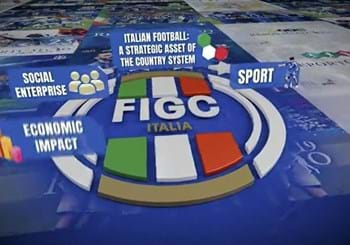
Measures in place for upholding and protecting human rights at UEFA EURO 2024
Overview of key measures to ensure an inclusive and respectful tournament for allThursday, June 13, 2024

UEFA EURO 2024 is committed to upholding and protecting human rights through a comprehensive set of measures designed to ensure the welfare and safety of all participants and spectators. The following detailed initiatives reflect UEFA’s dedication to creating an inclusive, respectful and secure environment for everyone involved in the tournament.
Human rights declaration
Issued in November 2023, the human rights declaration for UEFA EURO 2024 marks a collaborative commitment by UEFA, the German Football Association (DFB), the German federal government and the ten host cities to protect and promote human rights. This declaration reflects UEFA’s commitment to integrating human rights considerations into all aspects of the tournament. The declaration was developed with input from various interest groups, stakeholders and human rights experts such as the Centre for Sport and Human Rights, the Sport and Rights Alliance, the EURO 2024 stakeholder initiative and the German Institute for Human Rights. The key areas of focus in this declaration include:
• Ensuring the tournament is accessible to all, including people with disabilities
• Promoting a culture of inclusivity and respect for diversity among all participants and spectators
• Implementing measures to prevent and address all forms of discrimination
• Safeguarding the physical and mental health of everyone involved in the tournament
Grievance mechanism
Recognising that human rights violations and abuses can occur in any context, UEFA has established an accessible and comprehensive grievance mechanism for EURO 2024. Since 1 June 2024, this mechanism has been available for anyone affected at any time by the tournament: from players to spectators, journalists, human rights defenders, as well as workers, volunteers, suppliers and service providers. Key features of the grievance mechanism include:
• The mechanism is operated independently by the German law firm Rettenmaier, with technical assistance from Legaltegrity.
• Reports can be filed via a secure online form, which is available in all the languages of the participating teams to ensure that language is not a barrier.
• Reports are handled confidentially by trained trauma specialists, and individuals can choose to remain anonymous.
• The mechanism is free to use and non-discriminatory, ensuring that everyone has equal access to report human rights violations.
Rapid response mechanism
In addition to the grievance procedure, a rapid response mechanism will be implemented at all venues during EURO 2024. This is designed to provide immediate assistance to spectators who feel harassed, discriminated against, threatened or otherwise unsafe. Key aspects of the rapid response mechanism are as follows:
• Dedicated teams will be available on match days to provide immediate help.
• Posters throughout the stadium will inform spectators about the rapid response mechanism and provide a QR code for easy contact.
• Spectators can also reach the dedicated team through this link. The technical set-up is supported by SAFER, a Football Supporters Europe-led project funded by the European Commission.
EURO 2024 ESG strategy
The human rights declaration, the grievance mechanism and the rapid response mechanism are all part of UEFA’s environmental, social and governance (ESG) strategy for the tournament. Launched in July 2023, the strategy encompasses targeted measures and investments across three pillars, connecting to 11 areas of action, which in turn are backed by 28 topics, 48 targets, 83 key performance indicators and 100 actions.
Fan integration
UEFA is dedicated to integrating fans into the operational planning and delivery of the tournament. A range of fan-led initiatives will take place in each host city across Germany, ensuring that fans are actively involved in shaping the EURO 2024 experience. To support these efforts, UEFA has appointed fan welfare coordinators in each host city, who will:
• Oversee activities and programmes designed to enhance the fan experience
• Ensure the consistent application of measures to prevent, mitigate and report any human rights violations
• Foster open communication and collaboration with fan groups to address their concerns and suggestions
EURO 2024 human rights board
To further enhance its commitment to human rights, UEFA has set up a UEFA EURO 2024 human rights board. The board comprises representatives of NGOs and expert stakeholders, including the Centre for Sport and Human Rights, Transparency International (Germany), Football Supporters Europe, the Sport and Rights Alliance, Reporter Ohne Grenzen, Kick In and the German Institute for Human Rights. The human rights board will:
• Provide expert guidance on human rights issues related to the tournament
• Serve as a central point of information for all matters related to human rights
• Facilitate communication and collaboration among stakeholders to share perspectives and shape best practices
• Observe and make recommendations on the operational implementation of relevant policies and actions
UEFA EURO 2024’s comprehensive approach to human rights is designed to ensure that the tournament is a celebration of diversity, inclusion and respect. UEFA general secretary Theodore Theodoridis outlined UEFA’s approach at the Sporting Chance forum in December 2023: “For us, social responsibility is not about compliance. Human rights for sporting organisations cannot be just about having a nicely worded policy or initiative. Human rights should be inherent in everything we do.”
By implementing these robust mechanisms for reporting and addressing human rights violations, integrating fans into the operational delivery of the event and establishing a dedicated human rights board, UEFA is committed to creating a safe, welcoming and inclusive environment for all. These measures not only reflect UEFA’s dedication to human rights but also set a precedent for future sporting events worldwide.




